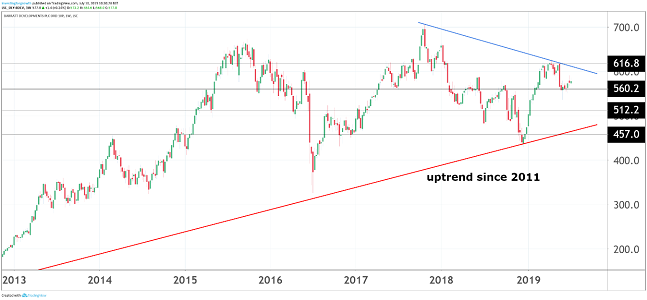
Barratt Developments: A cheap income play too good to miss?

There’s lots to like about housebuilders, but all may not be what it seems, writes our head of markets.
Until recently, the housebuilders had been directly in the firing line given Brexit uncertainty. This position has changed of late as the sector generally continues to make hay while the sun shines.
The backdrop has been supportive for some considerable time, as historically low interest rates, initiatives such as Help to Buy, and a general housing shortage have played into the hands of the likes of Barratt Developments (LSE:BDEV).
The company has been capitalising on this environment, while also mindful of not repeating the mistakes it may have made leading up to and including the financial crisis. The company now has net cash of around £765 million, which is strong insurance against any downturn, and in the meantime this strong cash generation has enabled it to pay special dividends by way of reward to shareholders, in addition to the basic yield of 4.8 per cent.
Operating margin is expected to have improved to 18.9 per cent from 17.7 per cent, forward sales are nearly 20 per cent ahead of the previous period, and the statement comes with a profits upgrade. Barratts is guiding for pre-tax profit of £910 million, ahead of market expectations and a 9 per cent improvement on 2018.
This is not to say that the Brexit shadow has been lifted, although, interestingly, the company has pointed out that 90 per cent of its housebuilding materials are either manufactured or assembled in the UK.

Source: TradingView Past performance is not a guide to future performance
Even so, depending of the nature of Brexit, there will be implications for the UK economy which, in any event, are likely to result in some short-term pain. Further out, the Help to Buy scheme will be removed in 2023, while interest rates will always be a cyclical concern. Nonetheless, those are not stories for today.
The performance of the shares has been rather more pleasing of late, reflecting at last an appreciation of how tightly the company is being run.
Despite a 5 per cent drop over the last quarter, the shares have added 19 per cent over the last year, which compares to a 2 per cent decline for the wider FTSE 100 during that period.
This has come at a cost to the market consensus, however, which has reduced to a ‘strong hold’, reflecting that, while Barratts is delivering on most if not all metrics, there are elements outside of its control which could yet cause some damage.
These articles are provided for information purposes only. Occasionally, an opinion about whether to buy or sell a specific investment may be provided by third parties. The content is not intended to be a personal recommendation to buy or sell any financial instrument or product, or to adopt any investment strategy as it is not provided based on an assessment of your investing knowledge and experience, your financial situation or your investment objectives. The value of your investments, and the income derived from them, may go down as well as up. You may not get back all the money that you invest. The investments referred to in this article may not be suitable for all investors, and if in doubt, an investor should seek advice from a qualified investment adviser.
